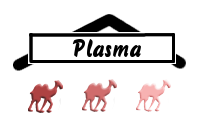Module Mapred_fields
module Mapred_fields:sig..end
Access to record fields
For line-structured files
Here, separator characters are used to mark where one field ends and the next begins. If, for instance, the record is "foo\tbar", the first field would be "foo" and the second "bar" (using TAB as separator).
val text_field_range : ?pos:int ->
?len:int -> ?sep:char -> ?field:int -> ?num:int -> string -> int * intlet (p,l) = text_field_range s: Extracts a field from s, and returns
in p the byte position where the field begins, and in l the
byte length. This means one can get the contents of the field with
String.sub s p l.
By default, the first field is selected.
If several fields are extracted, p is the position where the
first field starts, and p+l-1 is the position where the last
field ends.
posandlen: These arguments may restrict the part ofswhere to extract fieldssep: The separator character, by default TABfield: Which field to extract. This number counts from 1. Defaults to 1.num: How many fields to extract. Defaults to 1.
val text_field : ?pos:int ->
?len:int -> ?sep:char -> ?field:int -> ?num:int -> string -> string
Like
text_field_range, but returns the contents and not the rangeval text_fields_range : ?pos:int ->
?len:int -> ?sep:char -> ?field:int -> ?num:int -> string -> (int * int) list
Like
text_field_range, but returns the ranges (p,l) for each
field separatelyval text_fields : ?pos:int ->
?len:int -> ?sep:char -> ?field:int -> ?num:int -> string -> string list
Like
text_field_range, but returns the contents of each fieldFor files with variable-size records
This is a binary encoding of fields. Each field is preceded by a length field. The length field can be a single byte (0-254), or the length field is the byte 255 followed by eight bytes encoding the length in big endian order.
val var_field_range : ?pos:int -> ?len:int -> ?field:int -> string -> int * intlet (p,l) = var_field_range s: Extracts a field from s, and returns
in p the byte position where the field begins, and in l the
byte length. This means one can get the contents of the field with
String.sub s p l.
By default, the first field is selected.
posandlen: These arguments may restrict the part ofswhere to extract fieldsfield: Which field to extract. This number counts from 1. Defaults to 1.
val var_field : ?pos:int -> ?len:int -> ?field:int -> string -> string
Like
var_field_range, but returns the contents and not the rangeval var_fields_range : ?pos:int -> ?len:int -> ?field:int -> ?num:int -> string -> (int * int) list
Like
var_field_range, but returns the ranges (p,l) for each
field separatelyval var_fields : ?pos:int -> ?len:int -> ?field:int -> ?num:int -> string -> string list
Like
var_field_range, but returns the contents of each fieldval var_concat : string list -> string
Returns a string with the encoded fields
Auxiliary functions
val escape : string -> stringval unescape : string -> string
Encode bytes that cannot be directly put into text fields with
escape sequences
val encode_alt64 : string -> stringval decode_alt64 : string -> string
Encode/decode a binary string using the "ALT-64" method. This
is essentially BASE-64 with a different alphabet.
The alphabet is chosen such that
alt64(x) > alt64(y) <=> x > y 

